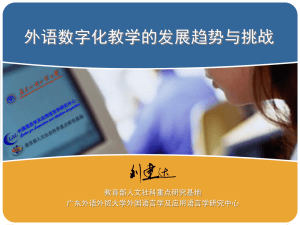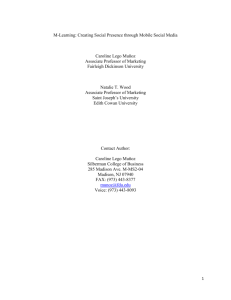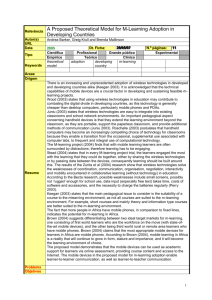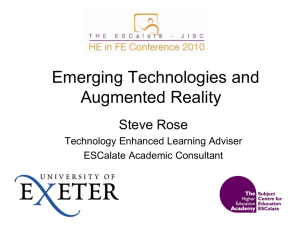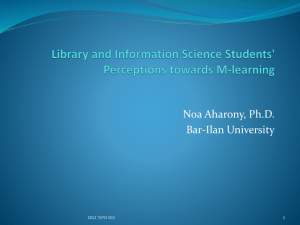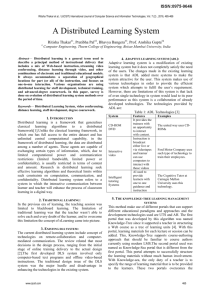Presentation Slides
advertisement
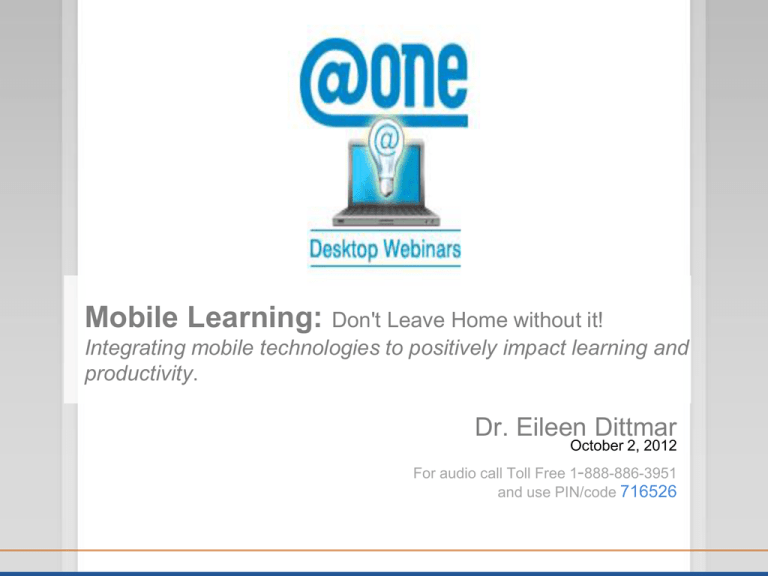
Mobile Learning: Don't Leave Home without it! Integrating mobile technologies to positively impact learning and productivity. Dr. Eileen Dittmar October 2, 2012 For audio call Toll Free 1-888-886-3951 and use PIN/code 716526 IF YOU ARE LISTENING OVER THE TELEPHONE, CLICK THE TELEPHONE HANDSET ICON. IF YOU ARE LISTENING OVER YOUR COMPUTER, ADJUST THE VOLUME WITH THE SLIDER. ENTER YOUR MESSAGE & CLICK ENTER – MESSAGE APPEARS IN CHAT WINDOW ABOVE. EMOTICONS Emoticons automatically disappear within seconds STEPPED Click once to step away, WAY clickA again to return HAND Click once to raise your hand, R clickAISE again to lower POLL RESPONSE CAPTIONER ADDS ICON TO THE SESSION CLICK CC ICON TO VIEW CLOSED-CAPTIONING WINDOW Make background and font changes here. Save closed captioning text by clicking dropdown and selecting save.. Each time you close the Closed-Captioning window a new transcript is started, so only the captions that were entered since the last time you opened the window will be saved. Mobile Learning: Don't Leave Home without it! Integrating mobile technologies to positively impact learning and productivity. Dr. Eileen Dittmar Faculty Chair Capella University eileendittmar.wordpress.com/mobile m-Learning This presentation A) guides a beginner toward integrating mobile technologies “in” classes. Included: Vast resources for intermediate level; ideas to eliminate student “struggles” B) guides faculty to understand ways students may incorporate mobile learning. m-Learning Mobile learning encompasses a range of interpretations including “using mobile devices for learning” and “learning when using a mobile device.” The mobile student learns while in different environments and likely with an array of different technologies. Ultimately, mobile is the adjective for student and for devices. Today’s educators are teaching mobile students who are using mobile devices/technologies. m-Learning Let’s consider the following to frame the contents of this presentation: Is “learn at school” and/or “learn at home” (i.e. one-stop shop) viable today as it was ten years ago? Does the fast growth of mobile devices impact the way people work and learn? Do mobile devices (i.e. Smartphone, tablet, netbook, global position system (GPS), digital audio/video recorder, and music player (mp3), replace the desktop or laptop computer? m-Learning Terminology: Mobile devices Smartphones (cell phone with operating system, Internet access, and software apps) Tablets (+ - 6x8” ½” thick; loaded with an operating system, internet access, and software apps) Netbooks (lightweight laptop, not powerful, but handy for quick email and Internet access) global position system (GPS provides location information and mapping) digital audio/video recorder music player (mp3) Terminology: Cloud (Internet storage of programs and files) m-Learning Specifically notable, when Apple launched the i-Pad, they expressed that it offered a different experience that will not replace the personal computer. AND since, other vendors have offered tablets maximizing on the value users want. Whereas, over the years, laptops have evolved into robust workstations that offer a workable solution to replace a desktop. The 2012 consumer electronics show featured mobile devices indicating a HOT market for ultrabooks, tablets, and Smartphones, but that netbooks are “slowing down” in new models and purchases. m-Learning In November 2011, the Summit on Future of Online Education, hosted by University Professional and Continuing Education Association (UPCEA, 2011), indicated mobile learning is the fastest segment of learning. Specifically, mobile technologies need to be integrated in online learning as well as traditional learning. In addition, early reaction from educators indicated lack of understanding how mobile learning fits within teaching and some are negative about the relevance. m-Learning However, mobile learning enthusiasts suggest that educators and students can use mobile devices in the classroom and for learning when on the go. If harnessed properly, supporters say, these devices can open new educational opportunities for educators and students. With the advent of the cloud, Smartphones, and tablets, learning no longer requires one place with one computer. Therefore according to supporters, educators need to find ways to integrate mobile learning, to adjust their course assignments, and update their communications accordingly. m-Learning Instructor Communications. Students have somewhat figured out how to adapt learning with their devices and adventurous faculty have already started to integrate mobile technologies. However, the trend and adaptation for faculty has been slower than for students in most instances. Notably, even the most tech savvy student can benefit from faculty communications that suggest ways to use mobile devices for the class work. Mobile is not an add-on, but requires infusion throughout the student experience (not necessarily “in” the classroom). Educators have new delivery options that can increase learning and impact productivity (while building excitement for your class). m-Learning Resources about Mobile Technologies Mobile Learning Blog http://mobilelearningtips.wordpress.com offers ideas about how to integrate mobile technology into learning and how to learn "when on the go." The blog offers ideas to advance computer and mobile technical skills, such as working "in the cloud" instead of remaining static -- only working with one computer in one location. Tip: The blog is a resource for faculty and students. m-Learning Mobile Resources. Few faculty or students need to know about every mobile technology. However to jump start the process of integrating mobile into learning, see the accompanying white paper (provided with this presentation), which offers a few website resources to help educators and students gain an understanding of mobile technologies pertinent to learning and productivity. Tip: Most mobile devices come with free tutorials and handson learning sessions offered by the vendor and/or provider (i.e. Google, AT&T, Verizon, Apple, etc.). m-Learning Technical Basics Mobile technologies can be a time saver and offer productivity. However, it is a good idea to invest enough time to gain an understanding of hardware basics, software applications, and operating systems for your computer(s) and mobile devices. For example, know where the files that are saved or downloaded get placed on your computer or mobile device. If the user cannot find a file to upload into a course website, the process is daunting. If the user downloads a file but cannot find it, the process is also daunting (next slide offers organization hints). Free computer and technical tutorials available online are provided in the accompanying white paper. m-Learning Have a folder named with something easy to see (such as the name of your class). Place files for the class in the folder to make it easy to find them. In addition, it is a good idea to study the computer and device browser's features to see where the download will go. For more mobile browser information, see http://livebinders.com/play/play/224967. It is important to know file types. For instance, Microsoft Word creates .doc files (prior to 2007 versions) or .docx files (versions 2007 and later). Microsoft Word alternatives can be used in most educational situations if the user saves files as .doc or .docx. Users can also perform file conversions (see FREE File Converters on the next page). m-Learning Free File Converters File converters, such as Zamzar or Go2Convert, are web tools to maximize learning on multiple devices and avoid the hassle of trying to open files that will not open. Neither web tool requires a login or registration to obtain a free file conversion. A quick submit of the current file type will quickly convert to another file type. Many educators and students indicate “must have” because the user can obtain the file type required for most devices and suitable for most class work by asking ZamZar or Go2Convert to convert it. m-Learning ZamZar returns the requested file to the user’s email address. Go2Convert returns the requested file directly inside their website. If you desire more conversion options, visit http://cooltoolsforschools.wikispaces.com/File+converters. Zamzar (http://zamzar.com/). Additional Information: ZamZar provides more free services when you open a free account. While you will see mention of fee-based services (i.e. cloud storage and enterprise features), you do not need to pay a fee for file conversions. No software required. Go2Convert (http://go2convert.com). Additional Information: Go2Convert provides "Knowledge Base" that gives you file type information. No software required. . m-Learning Social Bookmarking Early internet users oftentimes added websites to their browser "favorites" or "bookmarks." When a user only has one computer and one or two browsers, that system worked. However with multiple devices and browsers, social bookmarking makes it possible to get to your websites no matter which device or browser. Most social bookmark sites offer the choice to keep the bookmark private or public; and oftentimes tag identifiers can assist with quickly finding sites stored and additional similar sites stored by other users. m-Learning There are several social bookmarking sites, shown at http://www.social-bookmarking-sites-list.com/. Choose one that best fits your needs and study its tutorials to quickly master social bookmarking to save you time and productivity. Create a lesson for your students to compare and contrast these social bookmarking sites. Provide a way for students to share updates to the features as the sites are continuously changing/updating features and new sites regularly appear. m-Learning Alison Topper (2011) created this presentation in Slideshare without audio. http://www.slideshare.net/alisontopper/acomparison-of-2-social-bookmarking-sites, which compares Delicious (http://delicious.com) and Diigo (http://diigo.com). The presentation also provides basic information about social bookmarking. m-Learning OpenOffice OpenOffice is full suite of office software available as a download "free" (donations are accepted) which offers an office suite that includes word processing, spreadsheets, and presentations. At OpenOffice.org (http://about.openoffice.org/index.html) it says "OpenOffice.org is both a product and an open-source project. OpenOffice offers a word processor, spreadsheet, and presentation software similar to Microsoft Office but not as robust. Nevertheless, usable for most school course work. m-Learning OpenOffice Resources. The following resources help users master OpenOffice software: Download OpenOffice http://download.openoffice.org/ For download help http://www.ehow.com/how_2107649_downloadopenoffice.html OpenOffice Tutorials http://www.tutorialsforopenoffice.org/ m-Learning Cloud Office Software Suites Arguably, the most popular cloud office software suites for students and faculty are Google Docs and Microsoft SkyDrive, which are detailed on the next slide. Notable is that Zoho, EditGrid, and other cloud suites offer various features worthy of a student contrast/comparison assignment applicable for certain academic disciplines. m-Learning Google Docs (http://docs.google.com/#all) Overview. Upload documents or create them; either way you can easily complete your school work and submit a document with the file type required -- without actually having the software on the computer or mobile device. When using Google docs, the user is "working in the cloud.“ Microsoft Live SkyDrive Description. You can use Microsoft Office Live, a cloud-based version of Microsoft’s office suite including Word, Excel, and PowerPoint. The versions are simplified but with basics provided (not all the bells and whistles of the full desktop software). However, it is sufficient for most school coursework. m-Learning Note that more Google Doc and Microsoft SkyDrive information including tutorial links are provided in the accompanying white paper. And Much More! The technologies discussed in this presentation are only a handful of technologies available for learning on the go. Smartphones and tablet users can choose from an array of document creators and readers of which some are free and others are fee-based. Faculty can provide a place where students can share their device options with the class. Furthermore, use a blog or wiki for ease in updating and sharing; this is a fast evolving arena that is exciting for many students. m-Learning Class Integration Ideas. Most likely, every class has an activity or two that could instantly offer students a way to integrate mobile learning. Here are some examples that can be completed, at home, at school, and on the go. Obviously, the level of detail of the class integration depends upon the grade level, students’ previous experiences, and academic program. Internet searching, capturing ideas from the search, and recording the information Active learning projects using global positioning services (GPS) for locations and distance m-Learning Finding or listening to mp3 files Creating audio or video with digital audio/video recorders (i.e. interviewing people for their thoughts on a topic related to a course assignment) Drafting an outline and many compositions related to course assignments Preparing budget information including tracking expenses Consumer skills with comparison shopping and cost configurations Brainstorming ideas for events Discipline-related readings and studies m-Learning Conclusion Going mobile for learning requires technical basics, hardware knowledge, software applications, and using various operating systems, while integrating them with performing certain class activities. With the increased demand for mobile devices, such as Smartphones, tablets, netbooks, GPS systems, digital audio/video recorders, and mp3 players, educators have unique opportunities to integrate mobile technologies into their classes that can impact learning and productivity. m-Learning This presentation offered cloud software suites, web-based software and applications and suggestions for how to use them to maximize learning and productivity. Along with the impeding competition in the tablet and Smartphone market, software applications (apps) are continuously invented and upgraded, which invite opportunities to enhance them into the curriculum. Cloud software suites, virtual storage, and productivity tools are exciting for students when the classroom offers ways to use them. This presentation discusses a customized mobile learning blog that provides access to the latest of tools as well as pedagogical considerations and reveals instructional activities utilizing mobile technologies for education. m-Learning Mobile learning encompasses a range of interpretations including using mobile devices for learning and learning when using a mobile device. The mobile student learns while in different environments and likely with different technologies. Further mobile learning is the fastest segment of learning (UPCEA, 2011). Specifically, mobile technologies need to be integrated in online learning as well as traditional learning. However, early reaction from educators indicated lack of understanding how mobile learning fits within teaching and some are negative about the possibility. Therefore, the ideas in this presentation offer tips and getting started ideas that invite the use of web tools and mobile learning “on the go.” m-Learning Thank you for following this presentation! Be sure to download the accompanying white paper if you would like more details AND, be sure to share additional ideas in my mobile technologies blog at http://mobilelearningtips.wordpress.com/ Warmest regards, ~Eileen Dittmar eileen.dittmar@capella.edu Q&A Thank you for your participation! eileen.dittmar@capella.edu http://eileendittmar.wordpress.com #dreileendittmar Be sure to download from my blog the accompanying white paper if you would like more details. Evaluation Survey Link Help us improve our seminars by filling out a short online evaluation survey at: https://www.surveymonkey.com/s/12FA_MobileTeaching 37
